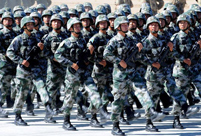 YOG kicks off in Nanjing
YOG kicks off in Nanjing
 Colorful life at Youth Olympic Village of Nanjing 2014 YOG
Colorful life at Youth Olympic Village of Nanjing 2014 YOG
 Royal Taoist temple to open to public
Royal Taoist temple to open to public
 Female soldiers at quake-hit area
Female soldiers at quake-hit area
 Shocking photos of cruel battles in Ukraine
Shocking photos of cruel battles in Ukraine
 Amphibious armored vehicle unit conducts open sea drill
Amphibious armored vehicle unit conducts open sea drill
 Water relay in Henan
Water relay in Henan
 Ethnic culture feasts eyes of travelers
Ethnic culture feasts eyes of travelers
 80 security dogs assembled in Nanjing police dog training base
80 security dogs assembled in Nanjing police dog training base
 Graffiti artists paint on street walls in Xinjiang
Graffiti artists paint on street walls in Xinjiang
BEIJING, Aug. 25 -- President Xi Jinping's two-day visit to Mongolia highlighted the importance China places on ties with neighbors and showcased the country's positive approach to neighborhood diplomacy.
The short but fruitful tour, the second of its kind made by Xi this year, also represents a new strategy for foreign policy.
China tops the world in terms of the number of neighboring countries. It shares land borders with 14 other countries and maritime boundaries with six.
Neighborhood diplomacy is an important part of China's foreign policy and the country views its surrounding countries as a community that share a common goal.
It is easy to understand why Chinese leaders have proposed a series of strategic concepts aimed at promoting regional prosperity and development.
These include the Silk Road Economic Belt with Central Asian countries, a Shanghai Cooperation Organization (SCO) development bank and a 21st-century maritime Silk Road with Southeast Asian countries.
The country also called for concerted efforts with the Association of Southeast Asian Nations (ASEAN) to build a China-ASEAN community.8 For the world's second largest economy, a sound and stable neighborhood environment translates to real benefits both for itself and its neighbors - closer bilateral ties, stronger economic and trade links, and more cultural and people-to-people exchanges.
At a conference on diplomatic work in October last year, Xi stressed the necessity of good diplomatic work in neighboring countries, saying the neighboring region has major strategic significance.
"We will uphold the guidelines of amity, sincerity, mutual benefit and inclusiveness in neighborhood diplomacy," Xi said while visiting Mongolia last week - a trip he compared to "visiting relatives."
"A good neighbor is not to be traded for gold," he said, citing a Chinese proverb.
Mongolia is the seventh country at China's doorstep Xi had visited after he took office as the Chinese President in 2013.
Already, the play-well-with-neighbors approach has seen him in Russia, Kazakhstan, Tajikistan, Indonesia, Malaysia, and the Republic of Korea (ROK).
Economic cooperation constitutes a major theme of these visits.
In Xi's first one-country foreign trip made last month to the ROK, they signed a deal for Chinese yuan clearance in Seoul and set the end of the year as the goal for negotiations on a free trade agreement.
Just before Xi's visit, China and Mongolia promised to lift bilateral trade to 10 billion U.S. dollars by 2020. Trade in 2013 was worth 6 billion dollars, representing nearly a 20-fold increased over 2002 levels.
"Welcome aboard China's train of development," Xi told Mongolian lawmakers during his visit to the country.
"China is willing to offer opportunities and room to Mongolia and other neighbors for common development," he said
"You can take a ride on our express train or even hitchhike, all are welcome."
But there is more to China's neighborhood diplomacy than just economic cooperation.
China established strategic partnerships with Turkmenistan and Kyrgyzstan last year, and upgraded bilateral ties with Indonesia and Malaysia to comprehensive strategic partnerships.
The recent visit to Ulan Bator also saw Xi and his Mongolian counterpart Tsakhiagiin Elbegdorj sign a joint declaration to upgrade bilateral ties to a comprehensive strategic partnership, signalling a higher level of political trust between the two sides.
Greater emphasis was put on the security front as well.
On Sunday, the Peace Mission 2014 military drill kicked off in north China's Inner Mongolia Autonomous Region, gathering some 7,000 troops from China, Russia, Kazakhstan, Kyrgyzstan and Tajikistan.
The six-day drill, which aims to deter terrorist forces such as the East Turkistan Islamic Movement and improve the competence of member state troops, will strengthen SCO members' resolve and capability to fight terrorism, and thus help maintain regional stability.
All these testify to the fact that China is devoted to building a closer neighborhood of growth and stability which is conducive to regional development and peace.
Thanks to concerted efforts from countries concerned, significant progress has been made so far in this regard, demonstrating with its own concrete actions China seeks no hegemony in its neighborhood.
 Special holidays
Special holidays World's top 10 fighters
World's top 10 fighters 'Stewardesses' serve in hospital
'Stewardesses' serve in hospital Beautiful night scenery of Nanjing
Beautiful night scenery of Nanjing ‘Peace Mission -2014’ joint anti-terror military exercise kicks off in China
‘Peace Mission -2014’ joint anti-terror military exercise kicks off in China Eye-catching guides at the opening ceremony of YOG in Nanjing
Eye-catching guides at the opening ceremony of YOG in Nanjing A female missile launch company of PLA
A female missile launch company of PLA China, the U.S., Britain and the Soviet Union call for Japan's unconditional surrender
China, the U.S., Britain and the Soviet Union call for Japan's unconditional surrender Photo story: How a baby panda grows up
Photo story: How a baby panda grows up Star-leveled nursing home in a small county
Star-leveled nursing home in a small county Evidence of monstrous crime of Japanese invaders
Evidence of monstrous crime of Japanese invaders Foreign models compete with Chinese in Cheongsam show
Foreign models compete with Chinese in Cheongsam show The beautiful pictures of ancient Chinese architecture
The beautiful pictures of ancient Chinese architecture The Muslims involved in relief work
The Muslims involved in relief workDay|Week|Month